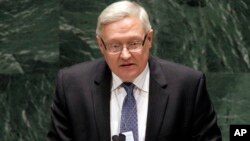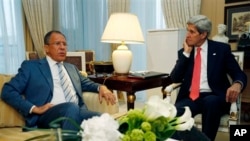A top Russian diplomat says Moscow will provide Syria advanced air missiles to deter any foreign intervention in the country.
Russian Deputy Foreign Minister Sergei Ryabkov told reporters Tuesday Moscow will send sophisticated S-300 anti-aircraft missiles as part of a contract signed several years ago.
Russia criticized the European Union's decision Monday to amend its arms embargo on Syria and allow weapons to be sent to the main opposition Syrian National Coalition, while keeping sanctions against the Syrian government.
Russia said the EU move will hurt efforts to hold a peace conference aimed at ending the country's violence.
Speaking after the EU announced its decision, British Foreign Secretary William Hague said there are no immediate plans to actually send weapons to the fighters trying to oust President Bashar al-Assad.
"This is a strong signal to the Assad regime, that it needs to engage on the political process and, as I have always said and as I have said to our parliament last week, we would only take the step of sending arms in company with other nations in carefully controlled circumstances and in compliance with international law," he said. "But this decision [Monday] gives us the flexibility in the future to respond to a worsening situation or to a refusal of the Assad regime to negotiate."
Britain and France have been the main advocates of arming the Syrian rebels, while Austria and Sweden have led a small group resisting the move for fear it could worsen Syria's civil war.
The EU Foreign Affairs Council said it will revisit its position on actual arms shipments before August 1. Any decision will come after consultations with U.N. Secretary-General Ban Ki-moon and after considering the state of a proposed Syrian peace conference.
Swedish Foreign Minister Carl Bildt expressed optimism about a political solution, and cautioned that now is not the time to send arms to Syria.
"I think it is very important that we have a very solid support for the political process," he said. "Because we now have the first possibility for a very long time, as a matter of fact since the last summer, for a political process and I think it is extremely important not to do anything to rock the boat. To start delivering weapons now would rock the boat. No one is intending to do that."
Syrian Opposition Undecided About Peace Conference
The EU recognizes the Syrian National Coalition as the legitimate representative of the Syrian people and strongly encouraged the group Monday to take part in the peace talks.
The coalition has not made a formal decision about taking part as it struggles to overcome internal divisions. The Syrian government has agreed "in principle" to participate.
U.S. Secretary of State John Kerry and Russian Foreign Minister Sergei Lavrov met Monday in Paris to discuss the proposed conference, and remained hopeful despite the challenges they face in pulling together the multi-national effort.
"It's not an easy task," Lavrov said. "It's a very tall order, but I hope that when the United States and the Russian Federation take this kind of initiative, the chances for success are there. We will do everything in our power to use those chances, and to make them realized."
Russia reiterated Monday its support for including Iran in the peace conference. Both Russia and Iran are Syrian allies. The United States has long criticized Iranian support for Mr. Assad, accusing Tehran of exacerbating the Syrian conflict rather than being part of the solution.
McCain Visits Syria
In another development Monday, influential U.S. Senator John McCain made an unannounced trip into Syria to meet with opposition fighters.
Syrian National Coalition spokesman Anas Abdah welcomed McCain's visit, explaining the importance of the senator's long-standing calls for greater U.S. assistance for the rebels.
"We think this is extremely significant because the senator has always supported the democratic aspirations of the Syrian people and the Syrian revolution since its beginning," he said. "He has also fought very hard within his country, in the U.S., for his government to take an active role in supporting the Syrian revolution and also in arming the Free Syrian Army."
Rebel commanders who met with McCain urged the United States to provide them with weapons and ammunition, enforce a no-fly zone against Mr. Assad's air force, and launch strikes against pro-Assad Lebanese Hezbollah militants in Syria and Lebanon.
The U.S.-based Syrian Emergency Task Force, which supports the Syrian opposition, said it organized McCain's trip, and published several photos showing the senator inside Syria.
The group's executive director, Mouaz Moustafa, said in an interview with CNN that McCain and rebel commanders also discussed ways to "marginalize" extremists who have emerged in Syria, and that the Free Syrian Army assured McCain that any weapons it receives will not fall into the wrong hands.
Free Syrian Army commander General Idris told the U.S. news site The Daily Beast, which first reported the visit, that McCain met with rebels on both sides of the Turkish-Syrian border. He said the rebels had come from all over Syria to see the prominent U.S. lawmaker.
McCain is one of the leading voices in the U.S. Congress calling for increasing U.S. aid to the rebels. His brief visit to Syria makes him one of the most senior U.S. officials to enter the country since the anti-Assad rebellion evolved into a civil war after peaceful protests in March 2011.
The Obama administration has provided non-lethal equipment and humanitarian supplies to the rebels. But it has been reluctant to intervene further, fearing U.S.-supplied weapons could end up in the hands of anti-American Islamist rebels.
Russian Deputy Foreign Minister Sergei Ryabkov told reporters Tuesday Moscow will send sophisticated S-300 anti-aircraft missiles as part of a contract signed several years ago.
Russia criticized the European Union's decision Monday to amend its arms embargo on Syria and allow weapons to be sent to the main opposition Syrian National Coalition, while keeping sanctions against the Syrian government.
Russia said the EU move will hurt efforts to hold a peace conference aimed at ending the country's violence.
Speaking after the EU announced its decision, British Foreign Secretary William Hague said there are no immediate plans to actually send weapons to the fighters trying to oust President Bashar al-Assad.
"This is a strong signal to the Assad regime, that it needs to engage on the political process and, as I have always said and as I have said to our parliament last week, we would only take the step of sending arms in company with other nations in carefully controlled circumstances and in compliance with international law," he said. "But this decision [Monday] gives us the flexibility in the future to respond to a worsening situation or to a refusal of the Assad regime to negotiate."
Britain and France have been the main advocates of arming the Syrian rebels, while Austria and Sweden have led a small group resisting the move for fear it could worsen Syria's civil war.
The EU Foreign Affairs Council said it will revisit its position on actual arms shipments before August 1. Any decision will come after consultations with U.N. Secretary-General Ban Ki-moon and after considering the state of a proposed Syrian peace conference.
Swedish Foreign Minister Carl Bildt expressed optimism about a political solution, and cautioned that now is not the time to send arms to Syria.
"I think it is very important that we have a very solid support for the political process," he said. "Because we now have the first possibility for a very long time, as a matter of fact since the last summer, for a political process and I think it is extremely important not to do anything to rock the boat. To start delivering weapons now would rock the boat. No one is intending to do that."
Syrian Opposition Undecided About Peace Conference
The EU recognizes the Syrian National Coalition as the legitimate representative of the Syrian people and strongly encouraged the group Monday to take part in the peace talks.
The coalition has not made a formal decision about taking part as it struggles to overcome internal divisions. The Syrian government has agreed "in principle" to participate.
U.S. Secretary of State John Kerry and Russian Foreign Minister Sergei Lavrov met Monday in Paris to discuss the proposed conference, and remained hopeful despite the challenges they face in pulling together the multi-national effort.
"It's not an easy task," Lavrov said. "It's a very tall order, but I hope that when the United States and the Russian Federation take this kind of initiative, the chances for success are there. We will do everything in our power to use those chances, and to make them realized."
Russia reiterated Monday its support for including Iran in the peace conference. Both Russia and Iran are Syrian allies. The United States has long criticized Iranian support for Mr. Assad, accusing Tehran of exacerbating the Syrian conflict rather than being part of the solution.
McCain Visits Syria
In another development Monday, influential U.S. Senator John McCain made an unannounced trip into Syria to meet with opposition fighters.
Syrian National Coalition spokesman Anas Abdah welcomed McCain's visit, explaining the importance of the senator's long-standing calls for greater U.S. assistance for the rebels.
"We think this is extremely significant because the senator has always supported the democratic aspirations of the Syrian people and the Syrian revolution since its beginning," he said. "He has also fought very hard within his country, in the U.S., for his government to take an active role in supporting the Syrian revolution and also in arming the Free Syrian Army."
Rebel commanders who met with McCain urged the United States to provide them with weapons and ammunition, enforce a no-fly zone against Mr. Assad's air force, and launch strikes against pro-Assad Lebanese Hezbollah militants in Syria and Lebanon.
The U.S.-based Syrian Emergency Task Force, which supports the Syrian opposition, said it organized McCain's trip, and published several photos showing the senator inside Syria.
The group's executive director, Mouaz Moustafa, said in an interview with CNN that McCain and rebel commanders also discussed ways to "marginalize" extremists who have emerged in Syria, and that the Free Syrian Army assured McCain that any weapons it receives will not fall into the wrong hands.
Free Syrian Army commander General Idris told the U.S. news site The Daily Beast, which first reported the visit, that McCain met with rebels on both sides of the Turkish-Syrian border. He said the rebels had come from all over Syria to see the prominent U.S. lawmaker.
McCain is one of the leading voices in the U.S. Congress calling for increasing U.S. aid to the rebels. His brief visit to Syria makes him one of the most senior U.S. officials to enter the country since the anti-Assad rebellion evolved into a civil war after peaceful protests in March 2011.
The Obama administration has provided non-lethal equipment and humanitarian supplies to the rebels. But it has been reluctant to intervene further, fearing U.S.-supplied weapons could end up in the hands of anti-American Islamist rebels.







